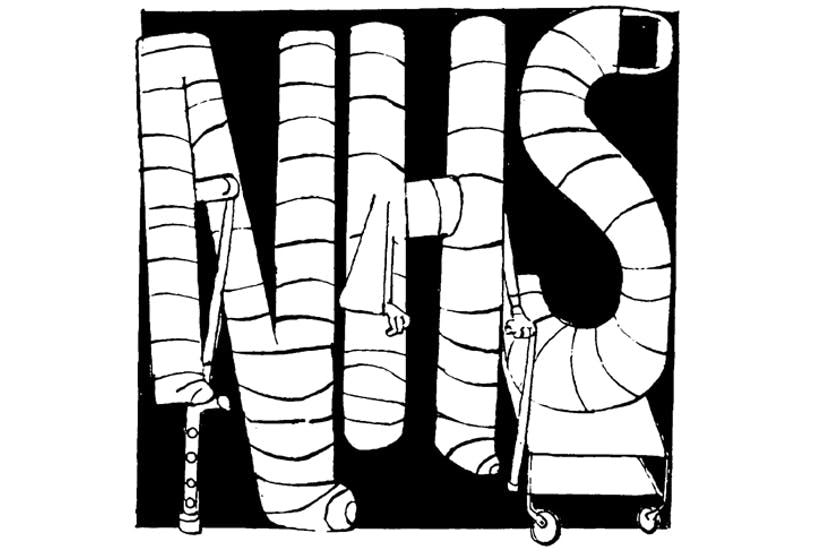Since the Budget, economists have pointed out that Britain is turning into a health service with a government attached. The NHS was protected from what Philip Hammond calls ‘austerity’, yet it has emerged as the big winner from his abandonment of the old Tory idea that government should live within its means. The plan is for more debt, more spending, more tax and a lot more NHS. At the start of the last decade, the NHS accounted for 23 per cent of government spending on public services: this figure is now set to rise to 39 per cent. And then, no doubt, further still.
Simon Stevens, the chief executive of the NHS, will soon run an organisation that has more people and money than some European Union countries. Meanwhile, the budgets of many other government departments are to be frozen or even cut. The Home Office and Department of the Environment, Food and Rural Affairs will each lose £100 million — as will, bizarrely in the year in which we will leave the European Union, the Department for International Trade. Contradicting Theresa May’s promise to make housing a priority, the budget for housing and communities will be reduced by £300 million. The military will continue in its semi-emaciated state, while taxes rise to a 30-year high.
What is it about healthcare that qualifies it for largesse on this scale when other public services have not been protected? It seems Gordon Brown taught the Tories to see the cost of the NHS as the yardstick against which the performance of all other public services should be judged. And as another former chancellor (and editor of this magazine), Nigel Lawson, once observed, the NHS is the closest thing the English have to a religion. Yet sooner or later a government is going to have to be brave enough to ask whether the NHS is really the fairest and most cost-effective way of providing healthcare.
There is plenty of evidence to suggest that it is not. On many healthcare measures, from cancer survival to hospital admissions for asthma and stroke survival rates, Britain comes out poorly in international comparisons. According to the King’s Fund, the UK ranks only 30th out of 195 countries when it comes to avoidable mortality — deaths that could have been prevented had effective healthcare been in place. The answer to sorting out these issues is not simply more money.
At least the Blair/Brown governments had some ambition towards NHS reform. They demanded it accept privately run clinics as part of the hospital system and they set up self-governing NHS foundation trusts in an attempt to restore local accountability.
The Tories seem unable to come up with original ideas. Extra money has been presented as a 70th birthday present for the NHS (a ruse that Mr Stevens was working on for several years) but not as extra public cash always should be: an investment on condition of improved performance.
So we have written the cheque without asking important questions. Such as: should healthcare really be funded almost exclusively through tax rather than, as it is in many other countries, through a mixture of tax, co-payments and insurance policies? As countries become richer, more money is spent on health. It should not be unthinkable that those who can afford it spend their own money. Why not charge for GP visits, as the Swedes do, or allow for extra investment to come directly from patients?
In trying to make everything free at the point of delivery, we end up rationing healthcare through that old Soviet device: the queue. Waiting lists are unheard of in many other developed countries. In Britain, they are a fact of life, despite ever-larger sums being poured into the NHS. Something is going seriously wrong.
People now live longer lives. This is an inevitable and welcome trend. But the reason the NHS keeps needing more money, as the new Health Secretary, Matt Hancock, points out, is because of awful technology. The NHS is now the world’s biggest purchaser of fax machines. It uses more than one in ten of the world’s remaining pagers (which are not only outdated but cost a great deal to run).
The wasted time and money is extraordinary. There is no reason why patients should not be able to manage their appointments online, or even conduct a consultation online — indeed, in a few instances, they can. Yet visiting a hospital or surgery can often feel like a bizarre throwback to a pre-computer age.
If extra money is to be given to the NHS, it must be used to modernise the institution. The NHS must not remain a technological museum. If Hancock proposes a decent plan, Mrs May should resist the urge to veto it. For years, the Tories have shied away from liberalising the NHS from the strictures of government bureaucracy. They now have few other options, because an unreformed NHS could bankrupt the government. If reform is to happen, it must happen soon.






Comments